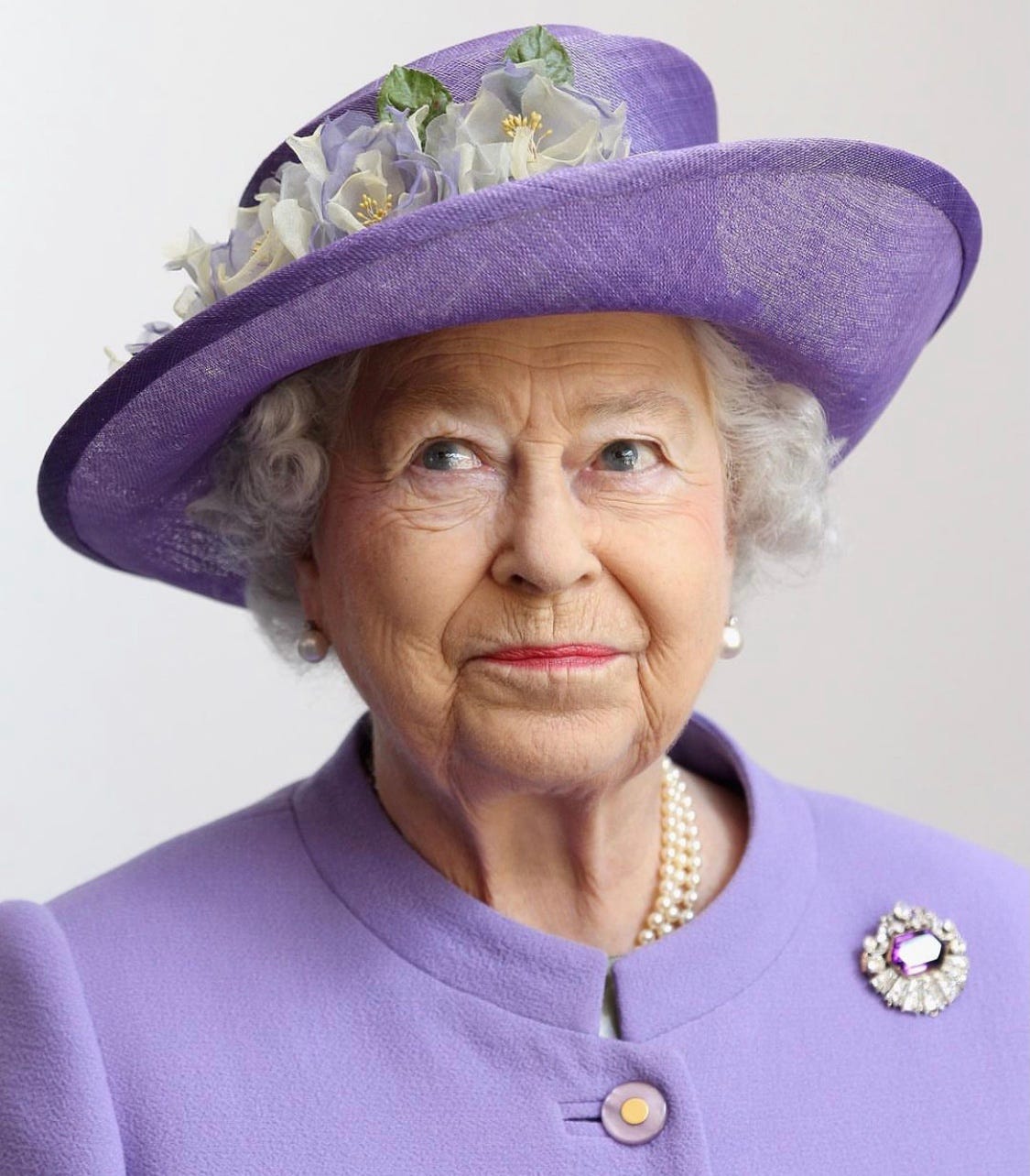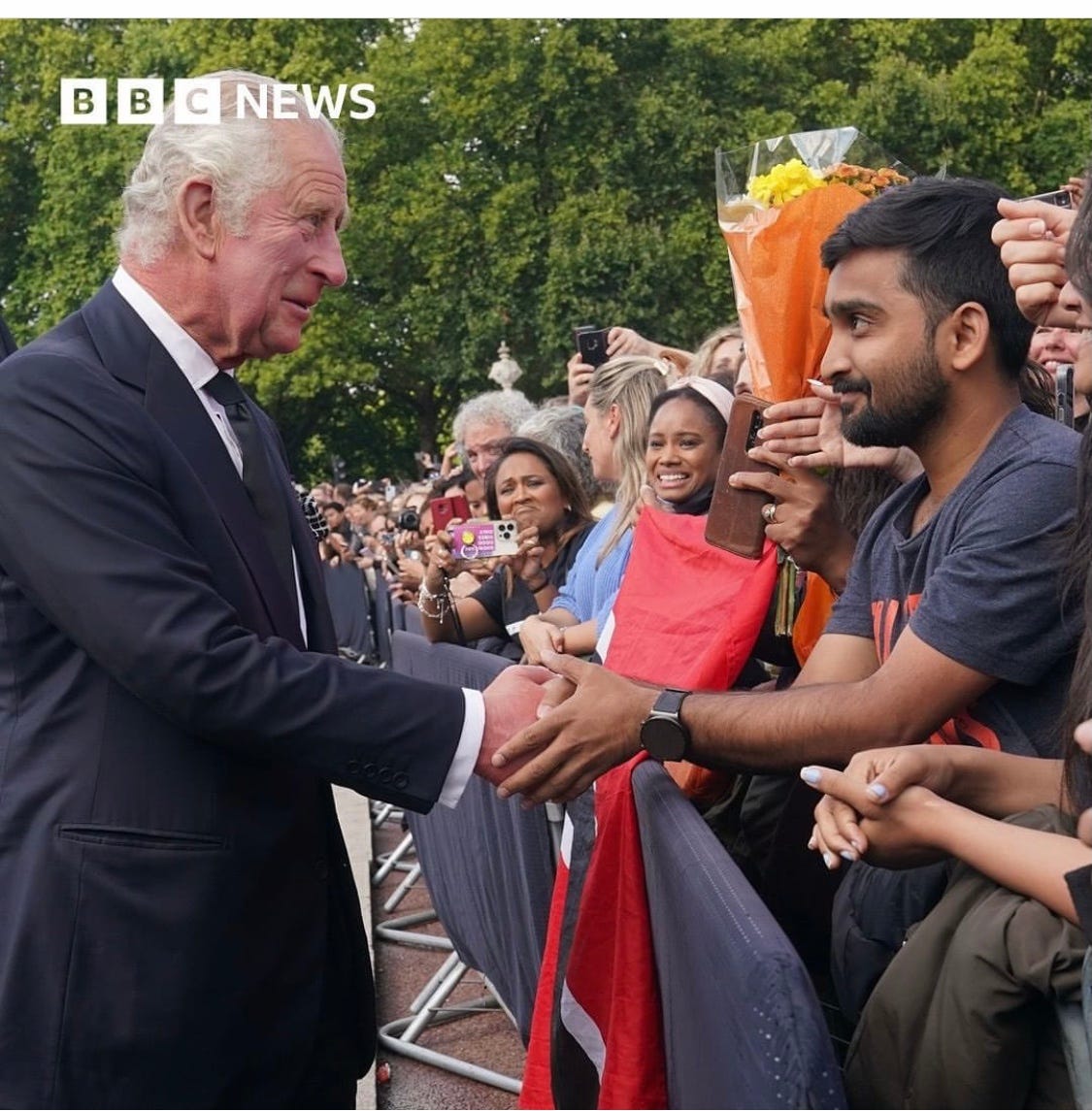As I wrote in my last piece, there is a Philip Larkin poem for everything. In 1977, on the celebration of Queen Elizabeth’s Silver Jubilee, he wrote the following in tribute:
In times when nothing stood
But worsened, or grew strange,
There was one constant good:
She did not change.
She did not. She adapted – we saw this on a number of occasions, not the least of which was after the death of Princess Diana. She took the long view – weathering and even accepting criticism, gossip, and opposition as part of her role - and I believe the reaction to her death proves that her approach was the correct one. Her steadfastness, her keeping her views on political affairs to herself, her refusal to bow to passing trends of language or fashion, are among countless reasons she should be admired and will be missed.
For many of us, it feels like a profound and personal loss. Familial. Rather like losing our parents again and as with our parents, there was always that unspoken belief – or childish longing – that she would be immortal. She was, after France’s Louis XIV, the world’s longest-reigning monarch. And he became king when he was 10, so frankly, I don’t think that really counts. I think she wins. She was the only monarch of my lifetime - her portrait in every school I attended. She was Canada’s queen for 70 of our 155 years. Remarkable. At my age, my parents had lived under four monarchs; my grandparents six. I am old enough to remember when we sang God Save the Queen in school along with O Canada.
She was that last link to our parents’ and grandparents’ generation, the daughter of a King and Queen who had so inspired them during World War II, the young woman who pledged her whole life to service of others and who remained faithful to that pledge. She was the first female British royal to be an active full-time member of the British Armed Forces and her willingness to serve her people across the Commonwealth lasted until the day before her death when she issued the following statement: “I would like to extend my condolences to those who have lost loved ones in the attacks that occurred this past weekend in Saskatchewan. My thoughts and prayers are with those recovering from injuries and grieving such horrific losses. I mourn with all Canadians at this tragic time.”
She was nearly pitch-perfect. She handled her family and private issues with no public self-pity or complaints. She could be humorous when appropriate, as with her Paddington Bear video or her appearance with Daniel Craig’s James Bond at the 2012 Olympics. There are a multitude of stories about her intellect and wit.
[Photo: Chris Jackson]
Where she also excelled was at giving comfort. There are many examples during her reign. On this day – September 11 – we do well to remember how she broke tradition, directing her Coldstream Guards to play the American anthem at Buckingham Palace two days after the attacks. I don’t think any world leader came close to showing the emotional intelligence she did during the pandemic. Ending her address to the Commonwealth with “We will meet again” was a beautiful nod to shared history and loss. It is true that she faltered at the death of Diana – ill-prepared and in shock at the event and the international emotional outburst – but that is the only time I can think of her being anything less than sure-footed. And of course, one could easily argue that the Queen’s reaction – wanting to keep her grandsons safe and protected – was the correct one, but so often, what is correct doesn’t gel with the zeitgeist.
These events were portrayed exceptionally well in one of my favourite films, The Queen. There’s a scene when Tony Blair (played by Michael Sheen), after days of working to convince Her Majesty to address her people, has had enough of those who are bullying the Queen and blasts his press secretary after the latter makes some particularly snide comments. It’s a wonderful moment and it sums up how I felt at the time (though I adored Diana) and how I feel now with much of the snark and cynicism I am currently hearing.
FYI, Rick McGinnis has written a terrific piece about the Queen on screen. (All of Rick’s film columns are worth your time.)
The usual naysayers are out there, blathering about empire and colonization and other matters of which they are ill-informed. If it were mere ahistorical silliness it would not bother me, but there are examples of vitriol and stupidity beyond the expected. There are more such examples and they will unfortunately continue in the coming days, but you get the idea. I expected it but it is highly unpleasant. No, Queen Elizabeth did not colonize, oppress or enslave anyone. In fact, she ruled with grace and respect over the end of colonies and empire. She did not murder anyone or destroy anyone’s culture. Her legacy is admirable and undeniable. If one wants to have an intelligent discussion about history, about empire - specifically about the British Empire, its crimes and its gifts, its negatives and positives, what is has left behind - that can be done, but it would require a knowledge and understanding of history that, from what I can see, none of Her Majesty’s social media critics possess. The irony, of course, is that the freedom we have to debate such matters comes, in large part, from our British heritage; this goes for the United States, as well. (Ask the people of Hong Kong whether they miss the British.)
If you have been following the coverage of the Queen’s death, you will have noticed that outside Buckingham Palace the mourners are diverse. One of the first people I saw interviewed Thursday afternoon was a young black woman wearing a hijab - she was in tears and talked about what the Queen had meant to her and about what a great sense of grief she was carrying. This is the gift Elizabeth II gave - a feeling of inclusivity, something you would assume might please wokesters. I noticed the same when Charles made his appearance Friday afternoon following his (seamless) succession to the throne - the crowd had arrived from every corner, every background, age and social class and they were there to cheer him.
[King Charles III Greets the Public, September 9, 2022. Photo: PA/Reuters]
I was studying in Italy a few years ago and an Italian classmate began mocking the fact that Canada still had a queen. I decided to give my Italian some practice and talked about how principled George VI had been during World War II. I did not mention - I did not need to - that I was drawing a comparison to Italy’s Victor Emmanuel III. Maybe the problem isn’t having a royal family, it’s having one with questionable or malleable values. In that sense, we dodged quite a historical bullet with the abdication of Edward VIII.
I am a huge admirer of the United States, but I prefer a system where the head of state is not also the head of government. Automatically, the separation of the two takes away from the power and self-importance of politicians - always a good thing - and offers continuity. This is dependent on the head-of-state keeping his political opinions private and there are reasons to worry that King Charles will not be able to manage that part of his responsibilities. But he has tried, in the past two decades, to carry himself more as his mother did and in his speech on Friday he said - in so many words - that he would put his causes aside. I have come to admire him. I am of the Diana-loving generation but as one makes one’s own mistakes in life (I lost count of mine ages ago), one is more forgiving. When I see King Charles with his Queen Consort, I see how right they are together and I can only imagine how hurt he has been by his narcissistic nitwit - and utterly gorgeous - daughter-in-law.
On the inner cover of my passport is a request from Canada’s Minister of Foreign Affairs that the holder be allowed to pass freely “in the name of Her Majesty the Queen.” When I get my passport renewed, I hope it will say, “in the name of His Majesty the King.” The anti-monarchists are already bleating - that is to be expected. But the royals cost Canadians less than the CBC and give us far more in return.
Long live the King.




